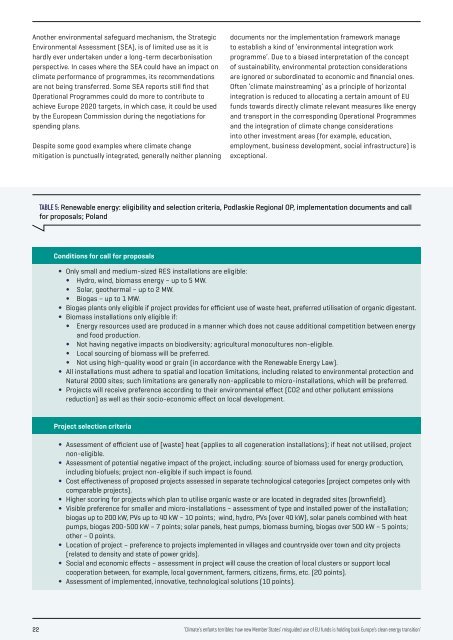ENFANTS TERRIBLES
enfants-terribles
enfants-terribles
You also want an ePaper? Increase the reach of your titles
YUMPU automatically turns print PDFs into web optimized ePapers that Google loves.
Another environmental safeguard mechanism, the Strategic<br />
Environmental Assessment (SEA), is of limited use as it is<br />
hardly ever undertaken under a long-term decarbonisation<br />
perspective. In cases where the SEA could have an impact on<br />
climate performance of programmes, its recommendations<br />
are not being transferred. Some SEA reports still find that<br />
Operational Programmes could do more to contribute to<br />
achieve Europe 2020 targets, in which case, it could be used<br />
by the European Commission during the negotiations for<br />
spending plans.<br />
Despite some good examples where climate change<br />
mitigation is punctually integrated, generally neither planning<br />
documents nor the implementation framework manage<br />
to establish a kind of ‘environmental integration work<br />
programme’. Due to a biased interpretation of the concept<br />
of sustainability, environmental protection considerations<br />
are ignored or subordinated to economic and financial ones.<br />
Often ‘climate mainstreaming’ as a principle of horizontal<br />
integration is reduced to allocating a certain amount of EU<br />
funds towards directly climate relevant measures like energy<br />
and transport in the corresponding Operational Programmes<br />
and the integration of climate change considerations<br />
into other investment areas (for example, education,<br />
employment, business development, social infrastructure) is<br />
exceptional.<br />
TABLE 5: Renewable energy: eligibility and selection criteria, Podlaskie Regional OP, implementation documents and call<br />
for proposals; Poland<br />
Conditions for call for proposals<br />
• Only small and medium-sized RES installations are eligible:<br />
• Hydro, wind, biomass energy – up to 5 MW.<br />
• Solar, geothermal – up to 2 MW.<br />
• Biogas – up to 1 MW.<br />
• Biogas plants only eligible if project provides for efficient use of waste heat, preferred utilisation of organic digestant.<br />
• Biomass installations only eligible if:<br />
• Energy resources used are produced in a manner which does not cause additional competition between energy<br />
and food production.<br />
• Not having negative impacts on biodiversity; agricultural monocultures non-eligible.<br />
• Local sourcing of biomass will be preferred.<br />
• Not using high-quality wood or grain (in accordance with the Renewable Energy Law).<br />
• All installations must adhere to spatial and location limitations, including related to environmental protection and<br />
Natural 2000 sites; such limitations are generally non-applicable to micro-installations, which will be preferred.<br />
• Projects will receive preference according to their environmental effect (CO2 and other pollutant emissions<br />
reduction) as well as their socio-economic effect on local development.<br />
Project selection criteria<br />
• Assessment of efficient use of [waste] heat (applies to all cogeneration installations); if heat not utilised, project<br />
non-eligible.<br />
• Assessment of potential negative impact of the project, including: source of biomass used for energy production,<br />
including biofuels; project non-eligible if such impact is found.<br />
• Cost effectiveness of proposed projects assessed in separate technological categories (project competes only with<br />
comparable projects).<br />
• Higher scoring for projects which plan to utilise organic waste or are located in degraded sites (brownfield).<br />
• Visible preference for smaller and micro-installations – assessment of type and installed power of the installation;<br />
biogas up to 200 kW, PVs up to 40 kW – 10 points; wind, hydro, PVs (over 40 kW), solar panels combined with heat<br />
pumps, biogas 200-500 kW – 7 points; solar panels, heat pumps, biomass burning, biogas over 500 kW – 5 points;<br />
other – 0 points.<br />
• Location of project – preference to projects implemented in villages and countryside over town and city projects<br />
(related to density and state of power grids).<br />
• Social and economic effects – assessment in project will cause the creation of local clusters or support local<br />
cooperation between, for example, local government, farmers, citizens, firms, etc. (20 points).<br />
• Assessment of implemented, innovative, technological solutions (10 points).<br />
22<br />
‘Climate’s enfants terribles: how new Member States’ misguided use of EU funds is holding back Europe’s clean energy transition’


